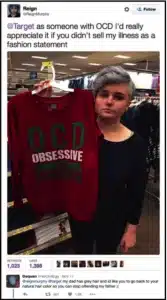Target Responds to Controversy: Woman Deems Sweater ‘Deeply Offensive’ and Target’s Unapologetic Stance – Is It Time to ‘Get Over It’?
In the realm of modern consumerism, brands occasionally find themselves at the center of controversies sparked by offended customers. One such incident recently unfolded at Target, a prominent clothing retailer in the United States. Reign Murphy, a regular shopper at Target, took to social media, specifically Twitter, to express her discontent with certain T-shirts sold by the store.

Murphy found the design of these T-shirts offensive and inappropriate, prompting her to share her dissatisfaction online. The T-shirts in question featured the phrase “OCD Christmas” with “OCD” standing for obsessive-compulsive disorder. Murphy argued that this message could be offensive to individuals genuinely struggling with this mental health condition, affecting their daily lives.

Obsessive-Compulsive Disorder (OCD) is a serious mental health issue affecting around 2.2 million Americans. Murphy’s concern stemmed from the belief that such a message should not be promoted in any store, especially not in a retail giant like Target, frequented by a diverse customer base daily.

Reign Murphy’s Twitter post gained traction, with many users resonating with her perspective. While some people with OCD may not find the message offensive, viewing it as a form of humor, Murphy and others shared a different sentiment. Social media often becomes a platform for individuals to express their opinions and share personal experiences, shedding light on the diverse perspectives surrounding such issues.

Responding to the controversy, Jessica Carlson, a representative from Target, issued a public apology to those who felt offended by the product. However, Carlson clarified that Target would continue to sell the T-shirts, asserting that there was no intentional harm intended, and hence, no reason to discontinue the product.
This incident underscores the delicate balance brands navigate in today’s socially conscious landscape. While some consumers are quick to voice their concerns about perceived insensitivity, brands, in turn, must carefully consider their messaging to avoid unintentional offense. In the era of social media activism, it becomes imperative to scrutinize and interpret messages accurately before sharing opinions online, recognizing the potential for misunderstanding and the impact it may have on brands and individuals alike.


